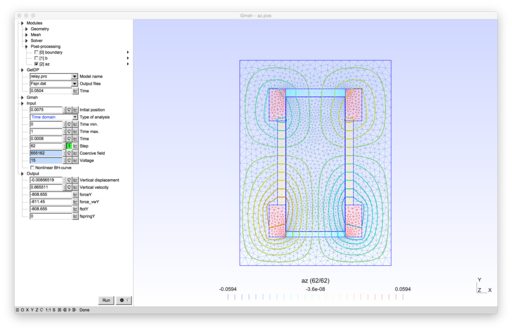Difference between revisions of "Electromechanical relay"
From ONELAB
| Line 4: | Line 4: | ||
The example contains: | The example contains: | ||
| − | * '''relay.pro''': 2D model of a linear actuator <ref name=Sab2003 /><ref name=Sab2004_phd />. | + | * '''relay.pro''': 2D model of a linear actuator <ref name=Sab2003 /><ref name=Sab2004_phd />. It comprises a yoke, two permanent magnets, two coils and a mover. The yoke and the mover are made of iron. Eddy currents in the magnets and in the laminated yoke and mover are neglected. The permanent magnets constitute a magnetic lock that keeps the mover either in the upper or lower position tending to diminish the residual airgap. The mover is moved down or up by applying a voltage pulse to one of the coils. The commutation is facilitated by two springs. |
| − | It comprises a yoke, two permanent magnets, two coils and a mover. The yoke and the mover are made of iron. | ||
| − | Eddy currents in the magnets and in the laminated yoke and mover are neglected. The permanent magnets constitute a magnetic lock that keeps the mover either in the upper or lower position tending to diminish the residual airgap. The mover is moved down or up by applying a voltage pulse to one of the coils. The commutation is facilitated by two springs. | ||
== References == | == References == | ||
| Line 14: | Line 12: | ||
[http://orbi.ulg.ac.be/handle/2268/22765 "Application of the fast multipole method to the 2D finite element-boundary | [http://orbi.ulg.ac.be/handle/2268/22765 "Application of the fast multipole method to the 2D finite element-boundary | ||
element analysis of electromechanical devices"], COMPEL: The International Journal for Computation | element analysis of electromechanical devices"], COMPEL: The International Journal for Computation | ||
| − | and Mathematics in Electrical and Electronic Engineering, 22(3):659-673, 2003. | + | and Mathematics in Electrical and Electronic Engineering, 22(3):659-673, 2003.</ref> |
<ref name=Sab2004_phd> R. V. Sabariego, [http://hdl.handle.net/2268/2374 "The fast multipole method for electromagnetic field computation | <ref name=Sab2004_phd> R. V. Sabariego, [http://hdl.handle.net/2268/2374 "The fast multipole method for electromagnetic field computation | ||
| − | in numerical and physical hybrid systems"], Ph.D. thesis, University of Li\ège, 2004./> | + | in numerical and physical hybrid systems"], Ph.D. thesis, University of Li\ège, 2004.</ref> |
</references> | </references> | ||
<div class="references-small"> <references /> </div> | <div class="references-small"> <references /> </div> | ||
Revision as of 11:51, 13 August 2013
|
2D model of an electro-mechanical relay.
|
 
|
|---|
|
Download model archive (relay.zip) |
Additional information
The example contains:
- relay.pro: 2D model of a linear actuator [1][2]. It comprises a yoke, two permanent magnets, two coils and a mover. The yoke and the mover are made of iron. Eddy currents in the magnets and in the laminated yoke and mover are neglected. The permanent magnets constitute a magnetic lock that keeps the mover either in the upper or lower position tending to diminish the residual airgap. The mover is moved down or up by applying a voltage pulse to one of the coils. The commutation is facilitated by two springs.
References
- ↑ R. V. Sabariego, J. Gyselinck, C. Geuzaine, P. Dular, W. Legros, [http://orbi.ulg.ac.be/handle/2268/22765 "Application of the fast multipole method to the 2D finite element-boundary element analysis of electromechanical devices"], COMPEL: The International Journal for Computation and Mathematics in Electrical and Electronic Engineering, 22(3):659-673, 2003.
- ↑ R. V. Sabariego, [http://hdl.handle.net/2268/2374 "The fast multipole method for electromagnetic field computation in numerical and physical hybrid systems"], Ph.D. thesis, University of Li\ège, 2004.

